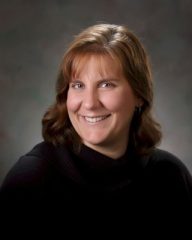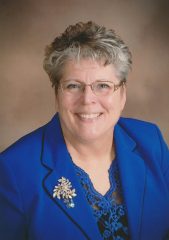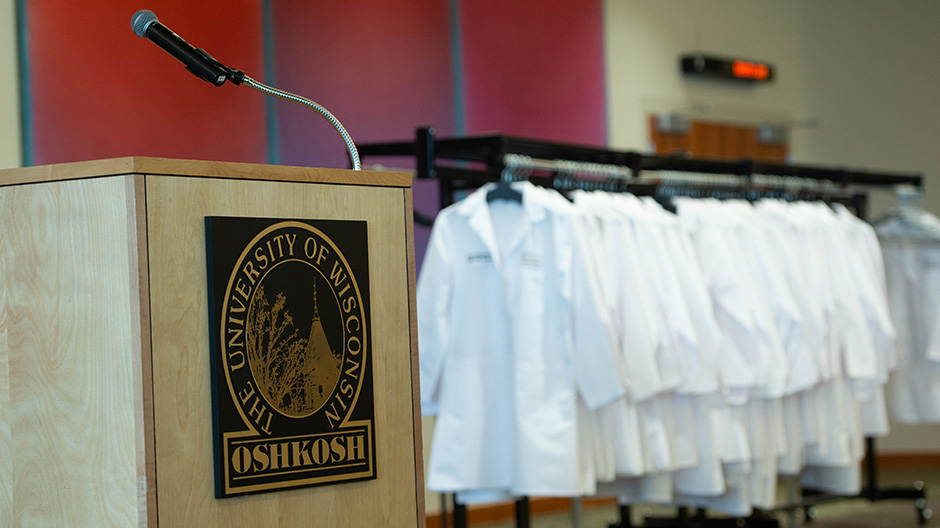Thirty-five University of Wisconsin Oshkosh students will graduate Saturday, May 16, with Doctor of Nursing Practice (DNP) degrees—the most in UWO’s history—in time to provide a helping hand when healthcare needs it the most.
 Bonnie Nickasch, director of the post-licensure program and assistant dean for the College of Nursing, said that in face of current events, the graduates have shown with great perseverance that anything is possible.
Bonnie Nickasch, director of the post-licensure program and assistant dean for the College of Nursing, said that in face of current events, the graduates have shown with great perseverance that anything is possible.
“I am impressed by the students’ attitudes and flexibility as their lives were turned upside down. On-campus classes were transitioned to online; on-site clinicals were cancelled and replaced with tele-health simulations; and assignments and due dates changed as faculty were called to work additional hours on the front lines,” Nickasch said. “The majority of the students were mandated to work extra hours on the front lines as well.”
In spite of the challenges they’ve faced, she feels certain that all graduates are more than ready to care for patients at this higher level.
“They have spent the last three to five years developing this advanced knowledge and are equipped to care for all patients, including the recent surge of COVID-19 patients,” she said.
 Kathy Wren, director of the DNP nurse anesthesia emphasis, also feels confident that this large graduating class is ready to go out into the workforce.
Kathy Wren, director of the DNP nurse anesthesia emphasis, also feels confident that this large graduating class is ready to go out into the workforce.
“Each of our students have done clinical projects and worked with clinical healthcare agencies in the Fox Valley,” she said. “We get them prepared and ready to go, so they can hit the ground running.”
Eleven of the 35 DNP graduates this spring comprise the first-ever graduating class from the nurse anesthesia emphasis, making them the first BSN to DNP doctoral-level nurse anesthetists to graduate in the state of Wisconsin.
“I couldn’t be more excited. This is a monumental day for UWO, as well as the state of Wisconsin,” Wren said. “Our inaugural class is plowing the way and setting the bar.”
Representing the highest level of education in specialized advanced nursing practice roles, the DNP degree prepares its graduates for the workforce with specialized courses, real-world clinical experience in healthcare agencies and a scholarly project required to graduate.
Scholarly projects conducted by the spring 2020 DNP graduates included:
- Lacey Anderson, of Green Bay, “Student Registered Nurse Anesthetists’ Perceived Self-Efficacy and the Effect of High-Fidelity Simulation”
- Kristian Bastress, of Menasha, “Reducing Hospital Readmissions for Patients Discharged from Skilled Nursing Facilities”
- Melissa Beck, of Marshfield, “Student Registered Nurse Anesthetists’ Perceived Self-Efficacy and the Effect of High-Fidelity Simulation”
- Jessie Bozelka, of Oshkosh, “Intravenous Lidocaine for Chronic Neuropathic Pain-Phase II”
- Rachel Brueggen, of Clinton, “Implementation of Obstructive Sleep Apnea Screening in a Primary Care Clinic”
- Abbey Buchberger, of De Pere, “Development of an Advanced Practice Clinician Onboarding Program”
- Kimberly Carolfi, of Arpin,“Evaluating a Pain Management Curriculum; Providing Additional Education from Identified Knowledge Deficits”
- Erica Ciulla, of Stevens Point, “Implementing a Substance Use Screening Tool Into Prenatal Visits”
- Katherine Dewane, of Green Bay, “Lead Free by Delivery: A Primary Prevention Strategy”
- Jeffrey Fillmore, of Gresham, “Concussion Education for the Coaching Staff of an Athletic Department in a Small School District in Central Wisconsin”
- Anna Gauthier, of Appleton, “Quality Improvement Initiative for Nurses Caring for At-Risk Newborns on the Finnegan Short Form”
- Nicole Gutman, of Sherwood, “Development of Provider Education on Vaginal Self-Swabbing for Gonorrhea, Chlamydia, Trichomoniasis, Bacterial Vaginosis and Yeast in Three Urgent Care Clinics”
- Melissa Henneman, of Appleton, “Preceptor Education and its Effect on the Self-Efficacy or CRNA Preceptors”
- Hilary Jahnke, of Columbus, “Implementation of a Screening Tool in Heart Failure Patients for Palliative Care”
- Stephanie Kuntz, of Oshkosh, “Integrating an Interdisciplinary Approach to Opioid Free Anesthesia and Analgesia”
- Robyn Lauritsen, of De Pere, “Utilization of Advanced Practice Providers in Primary Care to Decrease Childhood Obesity”
- Dana Lehrer, of Appleton, “Trauma Informed Care and Its Impact on Recidivism Rates in the Incarcerated Female Population”
- Alyssa Mader, of Neenah, “Bridging the Gap Between Primary Care and Community-Based Lifestyle Medicine Programs”
- Jayne McGrath, of Oregon, “Decreasing Patient Errors through Improving Handoff Communication”
- Casey Neuman, of Wausau, “Opioid Free Anesthesia and Analgesia”
- Allison Nierode, of Fitchburg, “The Effect of Preceptor Education on the Perceived Self-Efficacy of CRNA Preceptors”
- Sarah Olson, of Van Dyne, “Implementing an Academic Practice Partnership between UW Oshkosh and Advocate Aurora Health”
- Brittany Petersen, of Port Washington, “SRNA Perceived Self-Efficacy and the Effect of High-Fidelity Simulation”
- Stephanie Philipp, of Green Bay, “Implementing a Case Management Model to Reduce Hospital Readmissions”
- Kellsey Provos, of Middleton, “Perceived Barriers to the DTaP Vaccinations in Parents and Guardians in Rock County: A Qualitative Study”
- Maribel Ramos, of Oshkosh, “Improving Knowledge of Airway Cuff Pressure Management within the Student Registered Nurse Anesthetist”
- Inshirah Robinson, of Oshkosh, “Assessing the Quality of Care for Total Hip Arthroplasty Patients: A Retrospective Chart Review”
- Tori Sauer, of Medford, “The Impact of Increasing Sun-Protection Counseling and Skin Cancer Screening”
- Jessica Schnell, of Fond du Lac, “Using the Columbia-Suicide Severity Rating Scale in Clinical Practice: Shining a Light on Suicide Risk”
- Jason Schultz, of Fond du Lac, “Retrospective Chart Review Studying the Effects of Ketamine Infusions for Chronic Neuropathic Pain”
- Nicole Sixel, of Kiel, “Professional Association Retention and Recruitment: A Strategic Plan and Strategies to Expand Membership”
- Sara Smith, of Kronenwetter, “Postpartum Hemorrhage: Evidence-Based Quality Improvement in North Central Wisconsin”
- Avery Spencer, of Oregon, “Improving Staff Communication and Patients’ Access to Postpartum Contraception: A Quality Improvement Project”
- Jodi Tesch, of Greenville, “Simulation-Enhanced Curriculum to Improve DNP-FNP Students’ Knowledge, Skills, and Confidence”
- Lynda Vielbig, of Oakfield, “Development and Implementation of an Ultrasound-Guided Peripheral Intravenous Catheterization Program”
Learn more:

